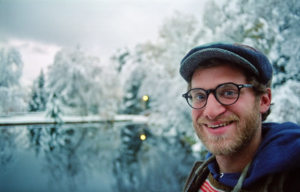
Words by Professor Alex Lee
“Environmental ethics” may sound like a chance to eat chia seeds while wearing Birkenstocks, talking about your favorite tree (there certainly is a bit of hippy tree hugger in the soul of any environmental ethicists), but it is, in fact, an academic field of study that investigates the normative dimensions of environmental problems and problem-solving. Environmental ethics is an arena of applied ethics, a branch of moral philosophy that systematically clarifies questions and evaluates arguments concerning right and wrong. This June, the International Society for Environmental Ethics (ISEE) came to campus for their annual meeting on environmental philosophy. The 4-day conference saw 25 scholars from around the world come together at APU and UAA to discuss their latest research in the field.
This year’s conference theme was “Extreme Environments and Environmental Justice.” We heard scholars delve into a wide range of intellectual traditions in environmental ethics – from western philosophy to native philosophy, to eastern philosophy. Many researchers highlighted issues concerning climate change, species loss, and conservation. Work engaged environmental ethics with both geopolitics and local communities from Puerto Rico to Europe.
The conference’s keynote address was given by Professor Kyle Whyte from Michigan State University. Professor Whyte discussed climate justice and environmental ethics work in native communities. He is a philosopher and a member of the Citizen Potawatomi Nation and melded insight from his own community with work he has done with Native communities across the Midwest, South, and American Arctic to weave together the realms of environmental concern and social justice. Professor Whyte ended his talk with a call for building discourse and pedagogy that recognizes the history of colonialism in America and indigenous intellectual traditions in academic canon.
Here are a few additional examples of research discussed:
-Steve Gardiner, Director of the Program on Values and Society at the University of Washington opened the conference with a call for a global constitutional convention concerning the rights of future generations. Professor Gardiner posed this idea as a necessary process for fair climate negotiations.
-Yasha Rohwer from the Oregon Institute of Technology presented a question for novel conservation: should we use gene editing technology to save species? Professor Rohwer argues that compassion for individuals coupled with a conservation imperative gives reason to develop and investigate gene drive technology.
-Daniel Callies from Goethe-Universitat Frankfurt presented an argument for incorporating procedural justice into talks about geoengineering. While many climate negotiations focus on the distribution of benefits and burdens – so-called distributive justice—Dr. Callies argues that the procedures by which decisions are made – the decisions that guide research, development, and deployment—are equally important to a just outcome.
The talks also included comparative research on interpreting philosophy from environmentalists John Muir and Aldo Leopold, to the French theorist Bernard Charbonneau, to the ancient Chinese philosopher Zhuangzi, to John Rawls’ theory of justice. Other topics included work on what we owe climate refugees, and work on the ethics of wilderness. Many of the researchers brought their work to bear on issues concerning Alaska and Arctic communities.
ISEE members where also given a chance to experience the Anchorage environment; several of us went hiking in Chugach State Park, walked down to Ship Creek to watch people fish, and explored a myriad of local trails.
I hope to bring more philosophy events to campus in the future. Stay tuned for more talks and discussions during the fall and spring semesters. Also, if any of the above issues sound interesting to you, consider taking an environmental ethics class!
